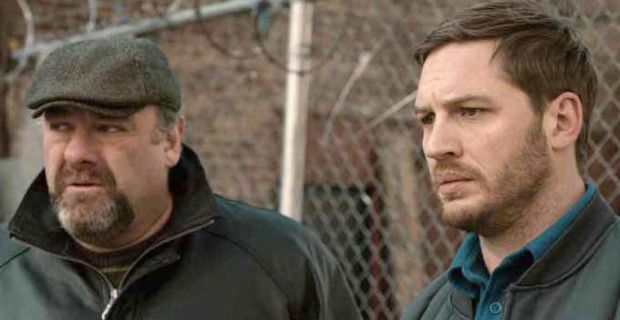
Film: The Drop
Starring: Tom Hardy, Noomi Rapace, James Gandolfini
Directed By: Michaël R. Roskam
Dennis Lehane, the author behind Gone Baby Gone, Shutter Island, and Mystic River trades violence in for humanistic subtlety with The Drop, based upon his short story Animal Rescue. Starring Tom Hardy (Warrior), Noomi Rapace (Prometheus) and James Gandolfini (The Sopranos), this new story about mobs and money in Brooklyn waxes about a man breaking his innocence in life more than anything. With an oft-times operatic and been-there-done-that representation of a crime-gone-awry in a seedy neighborhood in Brooklyn, The Drop is held up by great performances and a direction that lingers instead of swiftly moving from plot point to plot point.
The story follows Bob Saginowski (Hardy) who works for Marv (Gandolfini) as a bartender at a local bar that seconds as a “money drop” for the local Czechoslovakian mob. Pressures are put on Bob and Marv after some up and coming thugs hold them up. Bob then finds a wounded puppy in Nadia’s (Rapace) trashcan that he decides to take in. This angers the previous owner, criminal lowlife Eric Deeds (Matthew Schoenaerts). Deeds, the mob, and Marv all have something up their sleeves come Super Bowl night. Bob gets stuck in the middle of multiple conflicts, forced to react.
Tom Hardy, an actor who is a towering cinematic presence in everything that he does (especially in Nicolas Winding Refn’s Bronson), tones down his physical bravado in exchange for a performance that is equal parts damaged and haunting. For the whole film, the audience is guessing what has brought Bob to be such a quiet, troubled, and seemingly mentally damaged man. Instead of acting like some schizophrenic who can’t interact with society, Hardy plays Bob as if he is the puppy he rescued; wounded, still learning, and uneasy with the thought of letting others into his life. This kind of subtle juxtaposition is where The Drop’s biggest strength lies as it’s mostly marketed as a violent crime drama. That isn’t to say that it doesn’t deliver on those things but the narrative isn’t in service of that trope.
Gandolfini, in his last role before he passed away, plays a man caught between a rock and a hard place. He plays someone who is forced to do something drastic in a certain situation. This isn’t to say his performance is generic and thin but as a last role, I was hoping for something that would break him from his gangster mold much like his Albert character in 2013’s Enough Said. Rapace is equally as good as Hardy as she plays someone with a past, having trouble from recovering from her past beau, and is thrust into a tensely violent situation. Rapace, an actress implanted into American cinema from Sweden (she was Lisbeth in The Girl with the Dragon Tattoo, the original trilogy), blends in with the scenery as she looks and is convincing as a woman living in the lowly projects of Brooklyn. One huge gripe I had with the film is that it took so long to capitalize on the mutual affection that Bob and Nadia shared. The confession of attraction takes forever when it’s so blatant that it will be coming. It of course comes after a climax that’s made up almost entirely of purely coincidental character interactions.
Michaël R. Roskam, whose only other narrative effort was 2011’s Bullhead (a film that got nominated for best foreign film at the Oscars), brings the audience into one of the most minimalistic representations of New York City. The way Roskam lingers on shots, forcing the characters through awkward silences that emit tension, is masterful in a way. In a lot of crime dramas today, the director likes to swiftly move along from violent act to violent act, which equally shocks the audience while advancing the narrative. Here, it seems as if Roskam had a great time by showing us events in these characters’ stories that don’t serve any sort of narrative. We just watch these people do human things like walking a dog, taking out the trash, having friendly drinks, and this all supplements how ‘lived-in’ The Drop feels more than anything.
The Drop isn’t revolutionary in any sense when it comes to crime dramas or human dramas for that matter, but the talent in front and behind the camera make this story worthwhile. In the hands of another director and cast, this story could have easily been beefed up to resemble something that Martin Scorsese would have made. Instead, the viewer is treated to a heartfelt (albeit kind of generic) story about innocence lost, hate, lust, and trust. The climax of The Drop will keep you guessing on when these multiple narrative arcs will collide and when they do, the payoff is quite great. For a film that is only 106 minutes, though, the ending drags on for a bit too long as it tries to bring closure to all parties involved. The Drop may not work on all levels but as a human drama, you’re going to have a hard time finding something as taut and impressionistic as this in the month of September.
GRADE: B-
Review written by Sam Cohen (Follow him on Twitter)
- MOVIE REVIEW: ‘Popstar’ has at least a few hits - June 3, 2016
- MOVIE REVIEW: ‘Neighbors 2: Sorority Rising’ is the rare sequel that tries - May 21, 2016
- MOVIE REVIEW: ‘The Nice Guys’ is a loopy, drunk masterpiece - May 20, 2016
